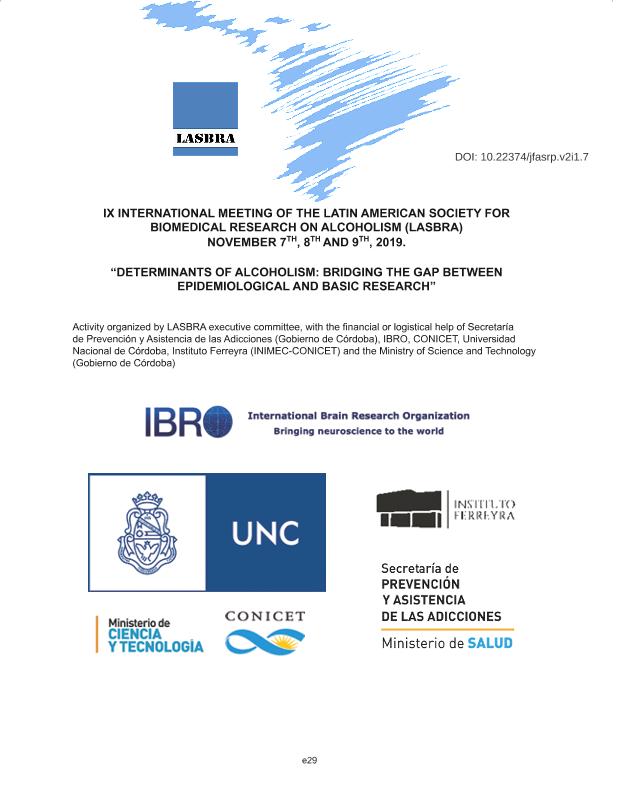Mostrar el registro sencillo del ítem
dc.contributor.author
D'aloisio, Génesis

dc.contributor.author
Anunziata, Florencia

dc.contributor.author
Acevedo, María Belén

dc.contributor.author
Macchione, Ana Fabiola

dc.contributor.author
Molina, Juan Carlos

dc.date.available
2022-07-21T00:11:03Z
dc.date.issued
2019
dc.identifier.citation
Ethanol-Related Learning in Rat Neonates Impact upon Apneic Episodes and Promote Seeking Behavior of Stimuli that Signaled the State of Intoxication; IX LASBRA International Meeting; Latin American Society for Biomedical Research on Alcoholism; Córdoba; Argentina; 2019; e42-e42
dc.identifier.uri
http://hdl.handle.net/11336/162693
dc.description.abstract
In rats, high ethanol doses during early postnatal life exert deleterious effects upon brain development that impact on social and cognitive abilities. This stage in development partially overlaps with the 3rd human gestational trimester in terms of synaptogenesis. At this stage, human fetuses and rat neonates (postnatal days 3-9) exhibit relatively high respiratory rates that are affected by subteratogenic ethanol doses. Recent studies suggest conditioned breathing responses in the developing organism given explicit associations between exteroceptive stimuli and the state of EtOH intoxication. The present study was meant to analyze how apneic episodes are affected by the drug itself or through learning processes involving this psychotropic agent. During PDs 3, 5, 7 and 9 rats were subjected to differential experiences with salient tactile cues explicitly paired or not with the effects of vehicle or EtOH (2.0 g/kg) intragastric administration. A tactile discrimination paradigm applied during PDs 3, 5, 7 and 9 was conducted under stressful circumstances (maternal deprivation, exposure to a novel environment and drug administration procedure) for the developing organism. Pups were individually tested in a whole body plethysmograph where a given tactile cue was presented under the state of sobriety while an alternative texture was associated with the state of intoxication. Ethanol intoxication systematically inhibited the occurrence of apneic episodes. Most importantly, it was observed that tactile cues (either smooth or rough) systematically paired with ethanol intoxication also promoted inhibitory effects upon the emergence of apneas (isodirectional conditioned response). The study also revealed that ethanol also results in a sensitization process relative to its inhibitory effects upon apneic episodes. At PD11, pups were tested in a two-way tactile preference test defined by the textures previously experienced. This test revealed that ethanol intoxication increased preferences towards the stimuli that predicted such a toxic state. These last results may imply both the systematically reported positive reinforcing effects of ethanol during early ontogeny and/or its negative reinforcement capability in terms of antianxiety effects. As a whole these results emphasize the need to consider ethanol’s motivational effects during early development upon the regulation of breathing patterns and subsequent affinity for the drug.
dc.format
application/pdf
dc.language.iso
eng
dc.publisher
Dougmar Publishing Group
dc.rights
info:eu-repo/semantics/openAccess
dc.rights.uri
https://creativecommons.org/licenses/by-nc/2.5/ar/
dc.subject
ETHANOL
dc.subject
NEONATE
dc.subject
RESPIRATORY PLASTICITY
dc.subject
APNEA
dc.subject
ETOH'S REINFORCING EFFECTS
dc.subject
ANXIETY
dc.subject.classification
Drogadicción

dc.subject.classification
Ciencias de la Salud

dc.subject.classification
CIENCIAS MÉDICAS Y DE LA SALUD

dc.title
Ethanol-Related Learning in Rat Neonates Impact upon Apneic Episodes and Promote Seeking Behavior of Stimuli that Signaled the State of Intoxication
dc.type
info:eu-repo/semantics/publishedVersion
dc.type
info:eu-repo/semantics/conferenceObject
dc.type
info:ar-repo/semantics/documento de conferencia
dc.date.updated
2022-07-19T15:46:23Z
dc.journal.volume
2
dc.journal.number
1
dc.journal.pagination
e42-e42
dc.journal.pais
Canadá

dc.journal.ciudad
Dundas
dc.description.fil
Fil: D'aloisio, Génesis. Consejo Nacional de Investigaciones Científicas y Técnicas. Centro Científico Tecnológico Conicet - Córdoba. Instituto de Investigación Médica Mercedes y Martín Ferreyra. Universidad Nacional de Córdoba. Instituto de Investigación Médica Mercedes y Martín Ferreyra; Argentina
dc.description.fil
Fil: Anunziata, Florencia. Consejo Nacional de Investigaciones Científicas y Técnicas. Centro Científico Tecnológico Conicet - Córdoba. Instituto de Investigación Médica Mercedes y Martín Ferreyra. Universidad Nacional de Córdoba. Instituto de Investigación Médica Mercedes y Martín Ferreyra; Argentina
dc.description.fil
Fil: Acevedo, María Belén. University of Illinois; Estados Unidos. Consejo Nacional de Investigaciones Científicas y Técnicas; Argentina
dc.description.fil
Fil: Macchione, Ana Fabiola. Universidad Nacional de Córdoba. Facultad de Psicología; Argentina. Universidad Nacional de Córdoba. Instituto de Investigaciones Psicológicas. - Consejo Nacional de Investigaciones Científicas y Técnicas. Centro Científico Tecnológico Conicet - Córdoba. Instituto de Investigaciones Psicológicas; Argentina
dc.description.fil
Fil: Molina, Juan Carlos. Universidad Nacional de Córdoba. Facultad de Psicología; Argentina. Consejo Nacional de Investigaciones Científicas y Técnicas. Centro Científico Tecnológico Conicet - Córdoba. Instituto de Investigación Médica Mercedes y Martín Ferreyra. Universidad Nacional de Córdoba. Instituto de Investigación Médica Mercedes y Martín Ferreyra; Argentina
dc.relation.alternativeid
info:eu-repo/semantics/altIdentifier/url/http://jfasrp.com/index.php/JFASRP/article/view/7
dc.relation.alternativeid
info:eu-repo/semantics/altIdentifier/doi/http://dx.doi.org/10.22374/jfasrp.v2i1.7
dc.conicet.rol
Autor

dc.conicet.rol
Autor

dc.conicet.rol
Autor

dc.conicet.rol
Autor

dc.conicet.rol
Autor

dc.coverage
Internacional
dc.type.subtype
Encuentro
dc.description.nombreEvento
IX LASBRA International Meeting; Latin American Society for Biomedical Research on Alcoholism
dc.date.evento
2019-11-07
dc.description.ciudadEvento
Córdoba
dc.description.paisEvento
Argentina

dc.type.publicacion
Journal
dc.description.institucionOrganizadora
Latin American Society for Biomedical Research on Alcoholism
dc.source.revista
Journal of Fetal Alcohol Spectrum Disorder
dc.date.eventoHasta
2019-11-09
dc.type
Encuentro
Archivos asociados
